Chess Notes
Edward Winter
When contacting us by e-mail, correspondents are asked to include their name and full postal address and, when providing information, to quote exact book and magazine sources. The word ‘chess’ needs to appear in the subject-line or in the message itself.
| First column | << previous | Archives [118] | next >> | Current column |
8647. The Drowser
Chess and Poetry has a set of three poems by B.H. Wood, published when he was aged 20. Below is a slightly earlier one, entitled ‘The Drowser’:
Ah, reverie! Ten thousand heads I see
Bent over chess-boards, an infinity
Of minds engaged in battle, fiendishly,
Keenly, or calmly, as the case may be:
World-wide, the neophyte, the veteran,
The studious problemist, the fairy fan ...
“What’s that? – I’m nearly sending you to sleep?
Sorry! – but this position’s rather deep.”
Source: Chess Amateur, September 1929, page 268.
8648. A missed win
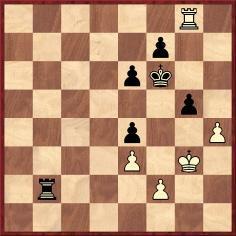
White could have played 40 h5, winning. A loose end concerning this position (Capablanca v Fine, AVRO, 1938) relates to Wolfgang Heidenfeld’s remark that 40 h5 was first pointed out by Paul Schlensker in Schach-Echo. No such reference has been found, but now Alan McGowan (Waterloo, Canada) notes that Schlensker discussed both AVRO games between Capablanca and Fine on pages 102-103 of the 5 April 1958 Schach-Echo, although without any treatment of the rook ending:
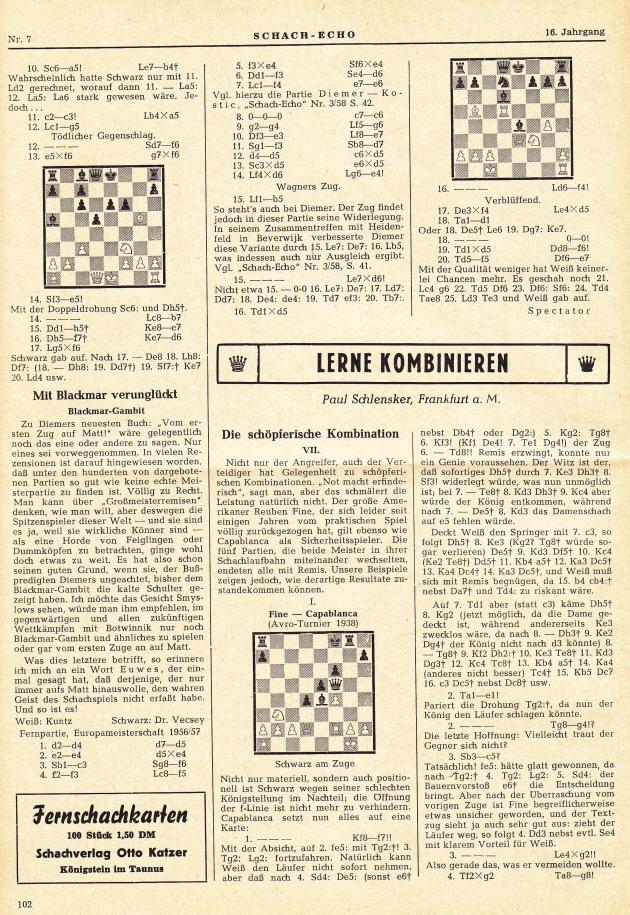
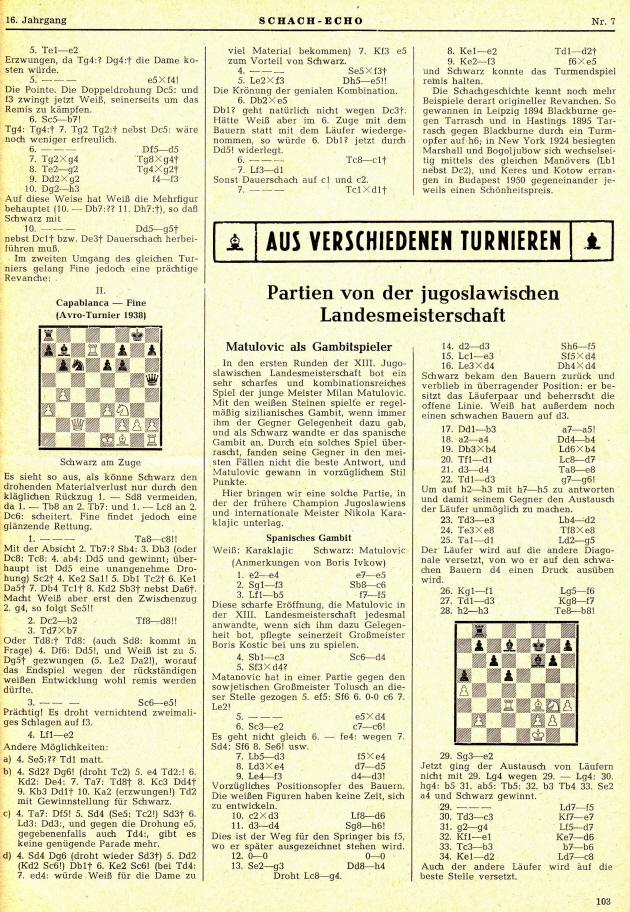
8649. Subsequent matches
To lapse into journalese, Carlsen and Anand are ‘set’ to play a ‘revenge match’. Use of that latter term (instead of ‘return match’ or ‘re-match’) is not new, and the oldest instance that we recall is on page 169 of CHESS, March 1947: a reference to ‘the Alekhine-Euwe revenge match’. The writer was Botvinnik (see Interregnum), and ‘матч-реванш’ is a common term in Russian, just as‘Revanche’ occurs in the equivalent German and French phrases.
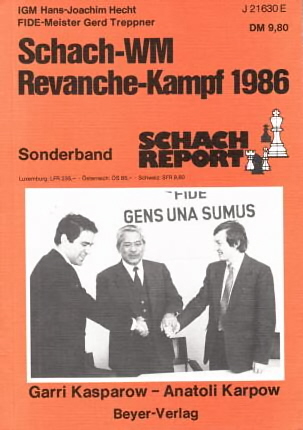
Whether ‘revenge match’ is good English is debatable, but it was used by Fred Reinfeld (‘a prompt revenge match’ between Euwe and Alekhine in 1937) on page 213 of The Great Chess Masters and Their Games (New York, 1952).
8650. Asztalos
v Herland (C.N. 5927)
From page 144 of the November 1919 Schweizerische Schachzeitung:
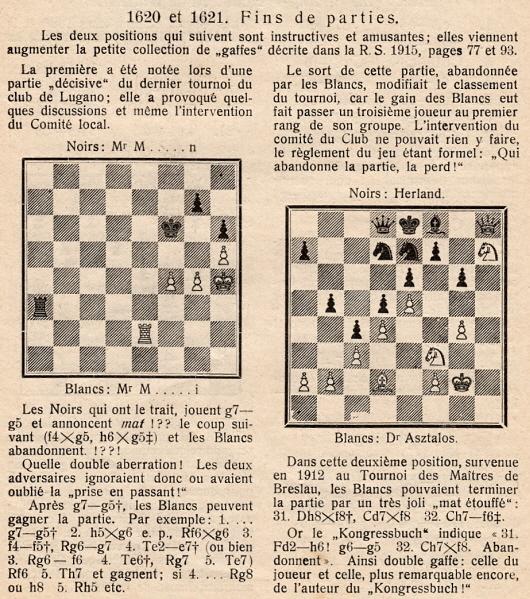
8651. Quotes
A recommendation prompted by, inter alia, the ‘Fair & Square’ feature in New in Chess:
Give the source of a quote if it is known. If it is not known, do not give the quote.
8652. Double check
From page 7 of The Brilliant Touch by Walter Korn (London, 1950):
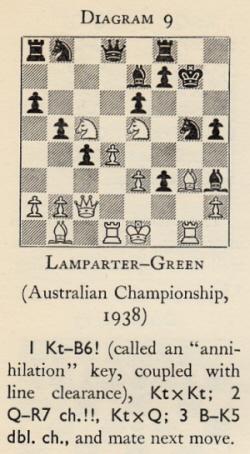
Further information is sought about this position, which was also shown by Irving Chernev on pages 12-13 of Combinations The Heart of Chess (New York, 1960):
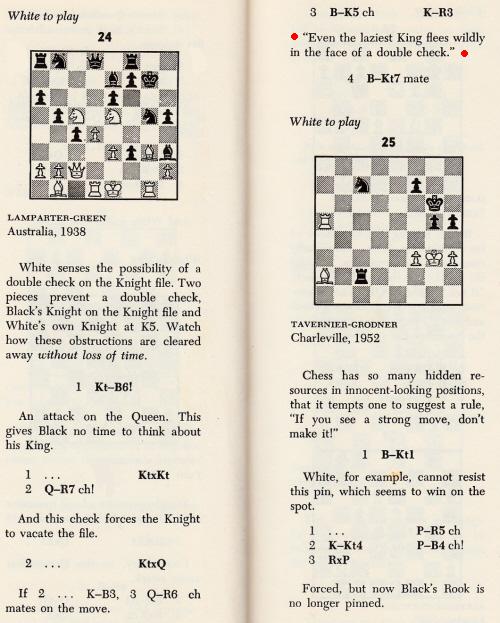
Concerning the note after 3...Kh6, it is unclear why Chernev did not mention that ‘Even the laziest king flees wildly in the face of a double check’ was a remark by Nimzowitsch. Chernev knew it, having given the attribution in an article on the inside front cover of Chess Review, November 1954:
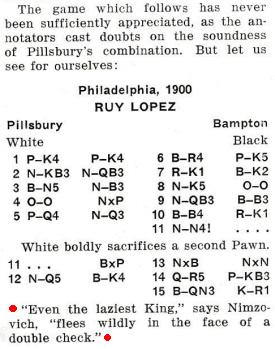
The full Pillsbury v Bampton feature was reproduced on pages 200-201 of Chernev’s book The Chess Companion (New York, 1968), and the position at move 13, when the black king flees from the threat of double check, may seem a better illustration than the Lamparter v Green position.
The remark appeared in My System, in the chapter on discovered check; page numbers vary according to the edition. On page 146 of the 2007 translation published by Quality Chess the text was:
‘Even the most sluggish king will panic – driven to flight after a double check.’
In the original of Nimzowitsch’s work, Mein System (Berlin, 1925), the passage was on page 156:
‘Selbst der trägeste König greift angesichts eines Doppelschachs zur wildesten Flucht.’
Whether a ‘perfect’ version of Nimzowitsch’s remark can be made is doubtful, but a curious point is that whereas the English translation from the 1920s (‘Even the laziest king flees wildly in the face of a double check’) is frequently quoted in books and articles, though usually without an exact reference, the original German text is seldom cited anywhere.
8653. Vienna, 1857
From Rod Edwards (Victoria, BC, Canada):
‘Page 14 of the 26 April 1857 issue of the Era has a brief report on a chess tournament in Vienna:
“Chess in Vienna. A chess tournament has lately been brought to a close in the Austrian capital. Four prizes were given, and 32 players entered the lists. The prizes were won by Herren Pitschel, Mayerhofer, Broda and Mole. We are promised some of their best games, and shall place them before our readers.”
A search through the Era for the rest of 1857 reveals no further reference to the event. Is information available from other sources?’
8654. High praise
Instances of surprisingly high praise are always
welcome. Pages 63-64 of the December 1929 Chess
Amateur introduced as follows Bogoljubow’s
71-move victory over Alekhine in the 14th game of that
year’s world championship match:
‘One of the finest games we have ever published.’
8655. Double check (C.N. 8652)
Christian Sánchez (Rosario, Argentina) has found the full Lamparter v Green game on page 50 of the 28 May 1938 issue of the Australasian:
George R. Lamparter – Martin Green
Victorian Championship, Melbourne, May 1938
Queen’s Gambit Declined
1 d4 Nf6 2 c4 e6 3 Nf3 d5 4 Bg5 h6 5 Bh4 Be7 6 Nc3 a6 7 e3 O-O 8 Bd3 dxc4 9 Bxc4 c5 10 Qe2 b5 11 Bb3 c4 12 Bc2 Bb7 13 Rd1 g5 14 Bg3 g4 15 Ne5 Bxg2 16 Rg1 Bh3 17 Bb1 h5 18 Qc2 Kg7 19 Ne4 Nh7 20 Nc5 Ng5 21 f4 gxf3 22 Nc6 Nxc6
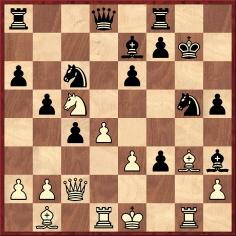
23 Qh7+. (‘Mate in three moves.’)
8656. The 1921 world championship match
Concerning the Lasker v Capablanca world title match, won by the Cuban with four wins, ten draws and no losses, C.N.s 814 and 2470 pointed out a claim on page 75 of La Stratégie, April 1921 that there had been a 15th game, played on 26 April (a Queen’s Gambit Declined supposedly won by Capablanca in 25 moves):
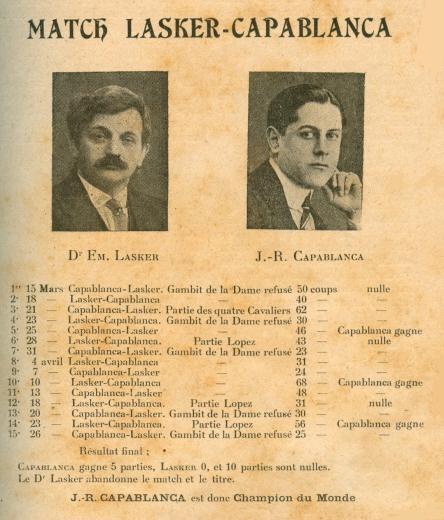
See page 187 of Chess Explorations and pages 356-357 of A Chess Omnibus. A comment by La Stratégie on page 115 of its May 1921 issue was also given in the latter book:
‘La quinzième et dernière partie du match, un Gambit de la Dame refusé, jouée, dit-on, le 26 avril, ne comporte que les quelques premiers coups de ce début, le Dr E. Lasker abandonna sans que sa position présentât le moindre désavantage; mais probablement pour mettre fin à une lutte qui lui était désormais impossible de soutenir avec succès.’
In C.N. 2470 we remarked:
It was intended to be a match of eight games up. Capablanca won the 14th game, concluded on 21 April, which made the score +4 –0 =10 in his favour. Lasker’s brief letter to Judge Alberto Ponce in which he proposed to resign the match was dated ‘Havana, 27 April 1921’. Page 101 of the May-June 1921 American Chess Bulletin gave the text, together with Ponce’s reply of the same date, which confirmed that Capablanca and the organizing committee accepted the proposal. On page 97 of that issue the Bulletin commented:
‘The great chess match, which made Cuba the cynosure for all eyes in the chess world, came to an end on 21 April. On that date the 14th and last game was contested. A few days later, officially on 27 April, though a mysterious press association “beat” made it two days earlier, Dr Lasker sent his resignation to the committee.’
Here, we add that La Stratégie was not alone in suggesting the existence of a 15th game. From page 80 of the May 1921 Schweizerische Schachzeitung:
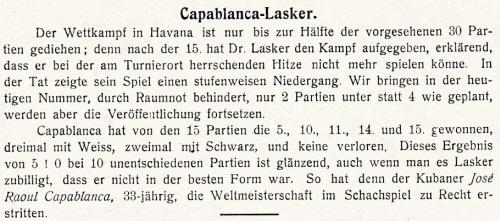
And from page 88 of the June 1921 issue of the Swiss magazine:
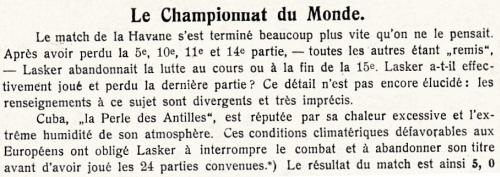
Wanted: other contemporary reports of an alleged 15th match-game, and, more generally, information on how the misunderstanding arose.
C.N. 3035 (see pages 241-242 of Chess Facts and Fables) noted Harry Golombek’s mistaken claims that the match comprised 18 games:
- The match chart in Capablanca’s Hundred Best Games of Chess (1947);
- The section on Capablanca in The Game of Chess (various editions from 1954 onwards);
- The section on Capablanca in Chess by H. Golombek and H. Phillips (London 1959);
- The entry on Capablanca (although not the one on Lasker) in the original edition of The Encyclopedia of Chess (1977).
8657. Meran, 1924 and 1926
Just published: Die internationalen Schachturniere zu Meran 1924 und 1926 by Luca D’Ambrosio (Bolzano, 2014), a deeply researched, luxuriously produced hardback (500 large pages). With the author’s permission two photographs are reproduced below, from pages 108 and 389 respectively:
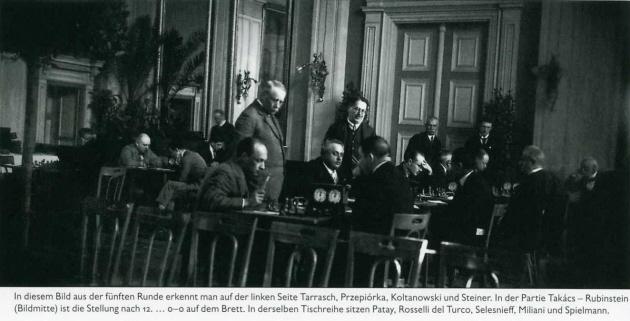
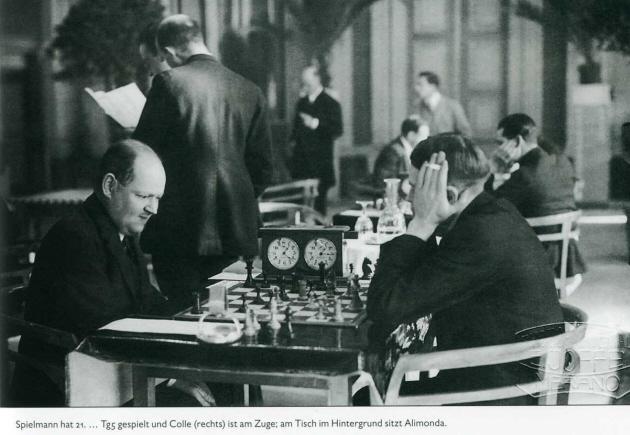
8658. Jünger and
Rotlewi
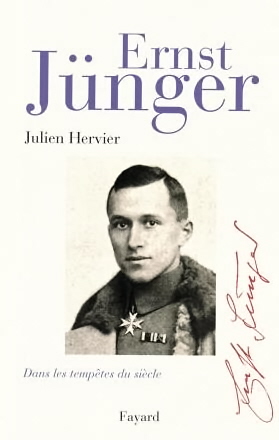
Georges Bertola (Bussigny, Switzerland) quotes from pages 44-45 of Ernst Jünger by Julien Hervier (Paris, 2014):
‘A Rehburg, de façon fort inattendue, c’est la passion de son père pour les échecs qui va le confronter abruptement à la redoutable violence d’un désespoir amoureux. Afin de s’entraîner, ce père invite en effet chez lui, pour des séjours prolongés, des maîtres reconnus du jeu d’échecs; c’est ainsi qu’Ernst Jünger rencontre le vieux Wurtensleben sur son déclin, le jeune Kurt Pahl qui connaîtra une belle carrière, Paul Saladin Leonhardt qui mourra en 1934 d’une crise cardiaque au cours d’une partie, ou encore un neveu d’Emanuel Lasker, champion du monde de 1894 à 1921; mais celui qui l’influence le plus est le célèbre Gersz Rotlevi [Rotlewi], dont le combat – perdu – contre Akiba Rubinstein, à Łódź, le 26 décembre 1907, est resté une référence pour les amateurs; né en 1889, il mourra prématurément en 1920, atteint de graves troubles nerveux. Ernst Jünger, qui l’accompagne dans de longues promenades à travers la lande, est frappé par sa personnalité douloureuse.’
The book also relates that when Jünger asked Rotlewi why he was so sorrowful, the latter replied with a line from Schiller’s La Mort de Wallenstein:
‘Qu’est-ce qu’une vie que l’amour n’éclaire pas?’
8659. A very rare predilection
From page 12 of Brentano’s Chess Monthly, May 1881, in an article of reminiscences by Alphonse Delannoy:
‘I should also include in the list of masters who played an original and amusing game the amateur whom Labourdonnais had nicknamed L’Ingénieux, M. Desloges.
In addition to the fantastic combinations in which Calvi and Kieseritzky indulged themselves, M. Desloges affected a very rare predilection, that of creating difficulties, in order to have the pleasure of extricating himself from them, and thus of exciting applause and admiration from bystanders. Sometimes by moving a pawn he could win a piece; no, he would play differently and purposely weaken his position, or else, if certain of winning, he would prolong the sufferings of his adversary and make him die by inches.’
As intimated in C.N. 8448 by G.H. Diggle (who quoted from the same article some comments about the Anderssen v Morphy match), Delannoy’s claims need to be examined with caution. Is it possible to find games by Desloges which support the contention that he had ‘a very rare predilection’?
8660. Emanuel Lasker
Richard Réti’s remark that Emanuel Lasker ‘often
deliberately plays badly’ was given in the section on
the former world champion in Masters of the Chess
Board (London, 1933); on page 124 of the German
edition (Mährisch-Ostrau, 1930) the wording was ‘Lasker
spielt oft absichtlich schlecht’. See too pages
404-405 of A Chess Omnibus, as well as C.N.
6889. We should like to give the full text of Réti’s
original article (‘published after the New York
tournament of 1924’).
A detailed study of Lasker’s play has just been published, John Nunn’s Chess Course (London, 2014), and it is unmissable.
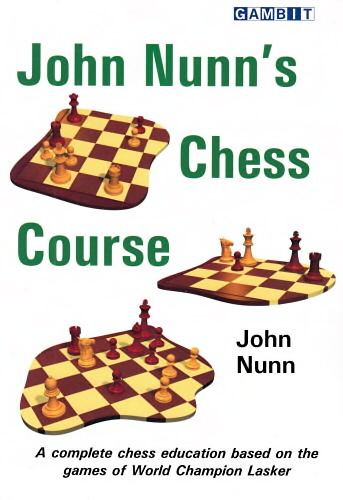
In his Introduction (page 7) Nunn writes:
‘... the myth has developed that many of Lasker’s wins were based on swindles, pure luck or even the effect of his cigars. In reality, there was nothing mystical or underhand about his games; they were based on a deep understanding of chess, an appreciation of deceptive positions and some shrewd psychology. Another myth for which there seems no real evidence is that Lasker deliberately played bad moves in order to unsettle his opponents. Certainly Lasker played bad moves, as all chessplayers do from time to time, but the point which struck me when analysing his games was how often he adopted a safety-first strategy. Lasker was a great fighter and had a strong will to win, but his winning efforts hardly ever crossed the boundary into recklessness; in almost every case, he played moves that appeared provocative but were no worse than the alternatives, with the important difference that they were more likely to induce a mistake.’
8661. Landau v ten Kate
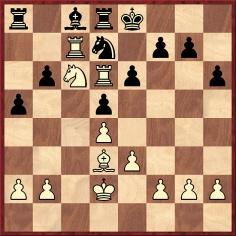
After 20 Bb5 Black resigned.
Fred Reinfeld gave the game (1 d4 d5 2 c4 c6 3 Nf3 Nf6 4 Nc3 e6 5 Bg5 Be7 6 e3 Nbd7 7 Rc1 O-O 8 Bd3 b6 9 cxd5 Nxd5 10 Nxd5 cxd5 11 Bxe7 Qxe7 12 Rc7 Qb4+ 13 Qd2 Qxd2+ 14 Kxd2 a6 15 Rhc1 Rd8 16 R1c6 h6 17 Rd6 Kf8 18 Ne5 Ke8 19 Nc6 a5 20 Bb5 Resigns) on pages 100-101 of Relax with Chess (New York, 1948) with this introduction:
‘It usually requires anywhere from 30 to 40 moves to achieve the paralyzing positional bind so dear to the heart of the modern master. Rare indeed is a game like the following one, in which a player is reduced to complete move-starvation in 20 moves. Even more remarkable is the fact that Black is not the victim of brilliant sacrificial play. White’s moves are quiet, but they speak volumes.’
Reinfeld stated that the game was played between S.
Landau and Ten Kate in Rotterdam in 1929. On page 14 of The
Pleasures of Chess by Assiac (New York, 1952) Black
was named as ‘Tenkate’, but we believe that he was T. ten
Kate, who was mentioned on, for instance, page 139 of the
May 1929 Tijdschrift van den Nederlandschen Schaakbond.
Wanted: information about the exact occasion of Landau’s victory, including early instances of its appearance in print.
8662. Untimely death notices
As noted in Chess and Untimely Death Notices, on page 218 of the October 1922 Deutsche Schachzeitung J. Berger wrongly reported, courtesy of Rinck, the deaths of four endgame composers, A. Troitzky, M. Platov, V. Platov and L. Salkind.
We can add that the misinformation was even restated on page 332 of L. Bachmann’s Schachjahrbuch 1922 (Ansbach, 1924):
‘Die bekannten russischen Komponisten Troitzky, Salkind und W. und M. Platoff sind während der bolschewistischen Wirren in der Krim ums Leben gekommen.’
8663. Tarrasch and New York, 1924
Information is sought about Siegbert Tarrasch’s absence
from New York, 1924 and, in particular, about a claim by
Al Horowitz on an unnumbered page in Solitaire Chess
(New York, 1962):
‘What really broke his spirit in the end was his non-admittance to the entry list of the great New York tournament of 1924. Lasker, who had been chosen to compete, had been wrangling for a higher retainer. The committee warned him that, if he didn’t accept the offer, Tarrasch would be his replacement. Lasker quickly came to terms.’
8664. Landau v ten Kate (C.N. 8661)
Thomas Niessen (Aachen, Germany) has
found the game on page 6 of the Nieuwe
Rotterdamsche Courant, 10 May 1929 and on page
2 of De
Telegraaf, 11 May 1929:


Our correspondent also points out a report on page 9 of Voorwaarts: sociaal-democratisch dagblad, 22 May 1929 that the game won a prize:
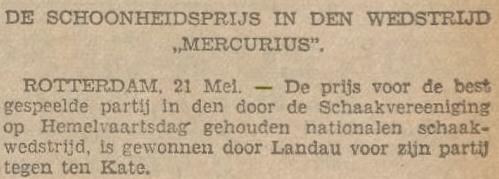
8665. Ernst Jünger (C.N. 8658)
From Alan McGowan (Waterloo, Canada) comes a paragraph by Jünger about the origins of 1 e4 Nf6 on page 86 of the 1 January 1925 issue of Kagans Neueste Schachnachrichten:
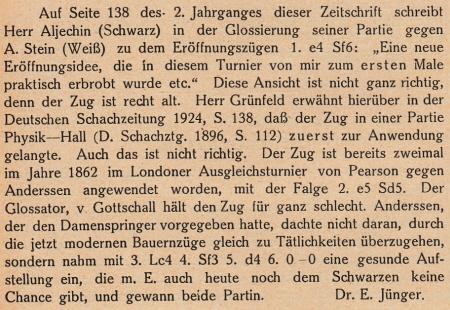
8666. Tarrasch and New York, 1924 (C.N. 8663)
Supplying links to parts one and two of an article by Hanon W. Russell about New York, 1924, Pete Klimek (Berkeley, CA, USA) notes that the first part has some references to Tarrasch.
8667. World championship games played in private
Greg Delaney (Little Chute, WI, USA) mentions the third game of the 1972 Spassky v Fischer match and asks for information about other chess games for the world championship which were not played in public. With readers’ assistance we should like to draw up a list, with details of the exact circumstances in each case.
Regarding the third match-game in Reykjavik, Frank Brady wrote on pages 249-250 of Profile of a Prodigy (New York, 1973):
‘The temporary playing room, located on the second floor of the stadium, above and to the rear of the stage, was a large, breezy, green-carpeted affair, used normally for table-tennis tournaments. Police guards were placed at the stairways to prevent anyone from reaching the room and disturbing the players. One unmanned, noiseless closed-circuit television camera, looking not unlike a spindly robot, was positioned about ten feet from the board.
During the game, I was in a small room about 20 feet away from the players, doing a remote broadcast for ABC’s Wide World of Sports, following the action on a soundless closed-circuit monitor and using an open telephone line to New York.’
8668. Landau v ten Kate (C.N.s 8661 & 8664)
Geurt Gijssen (Nijmegen, the Netherlands) informs us that Teunis ten Kate was born in Uithuizermeeden on 12 May 1906 and died in Leiden on 31 October 1996. He taught Latin and Ancient Greek and was the headmaster of the Christian Marnix Gymnasium in Rotterdam:
‘I was a pupil at the Marnix Gymnasium when he was still a teacher, and we played chess from time to time.’
8669. Tartakower’s wit
‘He was the wittiest man I ever met’, wrote Harry Golombek about Savielly Tartakower on page 65 of Chess Treasury of the Air by Terence Tiller (Harmondsworth, 1966). Some bons mots were given on subsequent pages.Below is an extract from part one of Edward Lasker’s article ‘The New York Tournament of 1924’, on page 185 of the March 1974 Chess Life & Review:
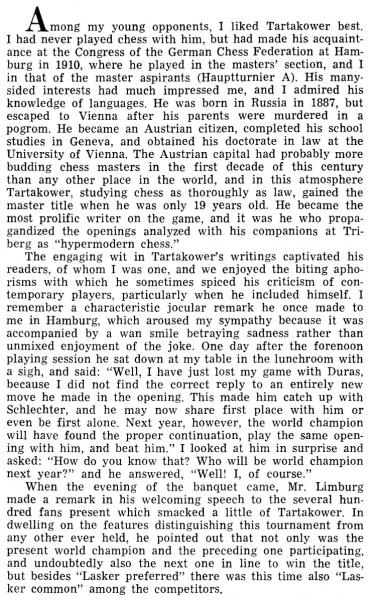
8670. Sultan Khan
From page 265 of the September 1929 Chess Amateur:
‘BCF Ramsgate Congress
The British Amateur Championship was won by Malik Sultan Khan, a young Indian gentleman of good family, 23 years of age, who holds the Indian Championship.’
The feature article Sultan Khan mentions that he was sometimes referred to as ‘Malik Sultan Khan’ or ‘Mir Malik Sultan Khan’. In Chess Personalia (Jefferson, 1987) by Jeremy Gaige the entry was headed ‘Sultan Khan, Mir (Malik?)’, and clarification is still sought.
8671. New Chronology
Information is wanted on Garry Kasparov’s belief in, or espousal of, the theory of New Chronology (Fomenko). As in the case of Kirsan Ilyumzhinov and Aliens, our interest is solely in first-hand statements, i.e. remarks by Kasparov himself, in the original Russian or English.
8672. Heaven (C.N.s 5600 & 6813)
A ‘once’ yarn from a column by Al Horowitz on page 8 of
the September 1948 Chess Review:
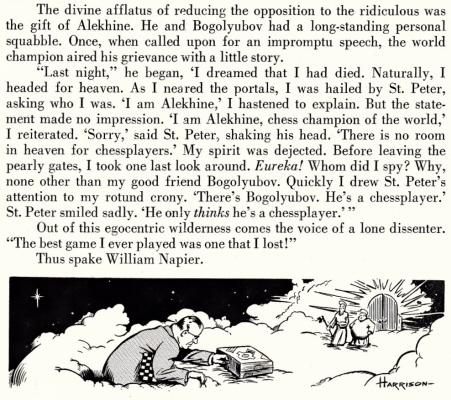
Horowitz also considered that the story, worded differently, merited a full page (page 134) in his book The New York Times Guide to Good Chess (New York, 1969).
The earlier C.N. items (see too page 229 of Kings, Commoners and Knaves) pointed out that the joke had been published on page 6 of the July 1898 American Chess Magazine. The earliest known inclusion of Alekhine and Bogoljubow’s names is in an article by Julius du Mont on page 133 of the May 1941 BCM.
8673. Seconds
Page 343 of The King by J.H. Donner (Alkmaar, 1997) attributed to Fischer a remark which requires verification:
‘Who is so strong that he could help me?’
Donner’s article, ‘Seconds’, was originally published in the 7 November 1981 issue of De Volkskrant and is also given on pages 352-353 of the paperback edition of The King (Alkmaar, 2006).
Our latest feature article is Chess Seconds.
8674. Susan Polgar
An article by Justin Horton posted at the Streatham & Brixton Chess Blog on 30 May 2014 says exactly what needed saying about the execrable journalistic standards of Susan Polgar.
| First column | << previous | Archives [118] | next >> | Current column |
Copyright: Edward Winter. All rights reserved.
